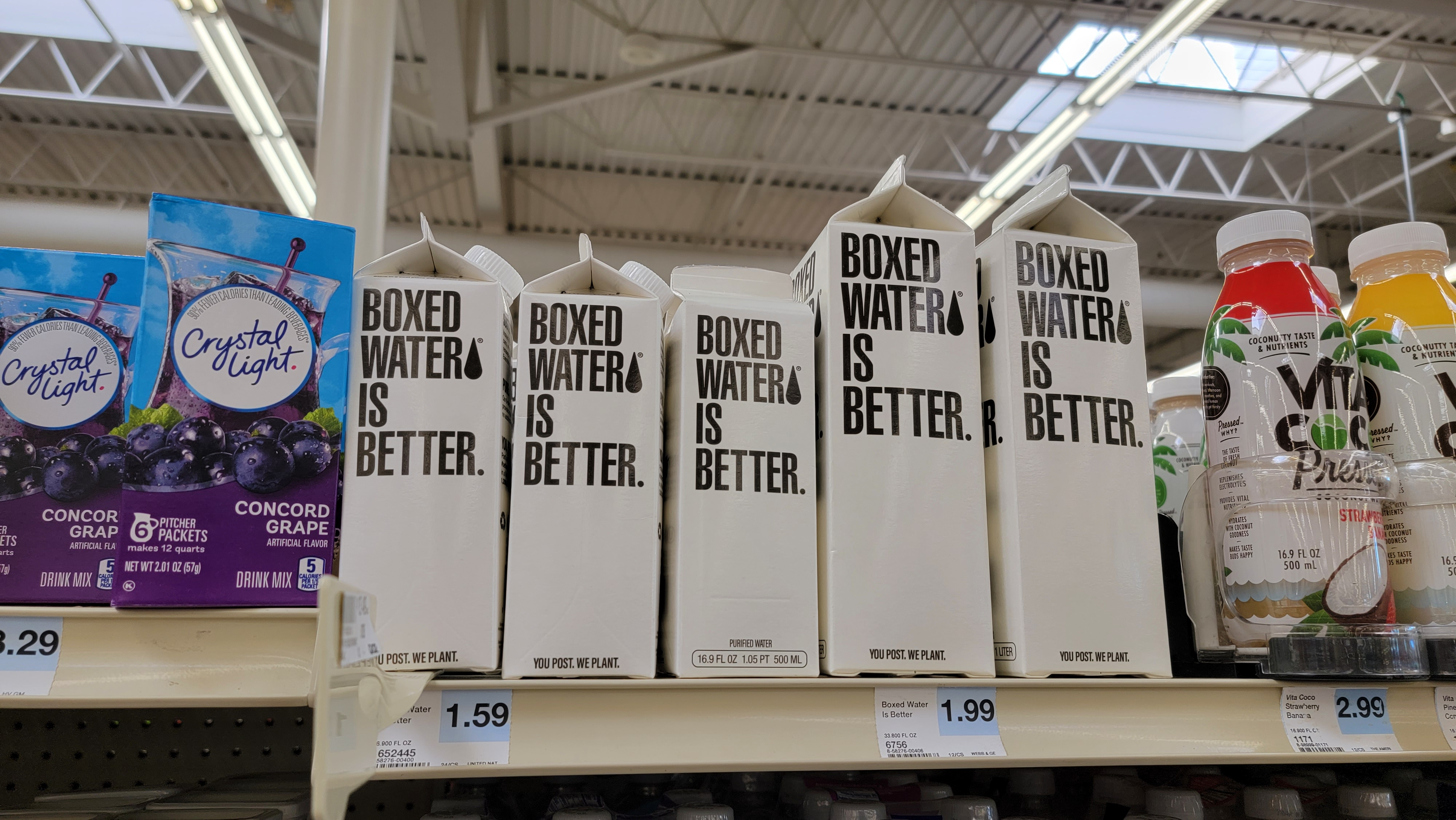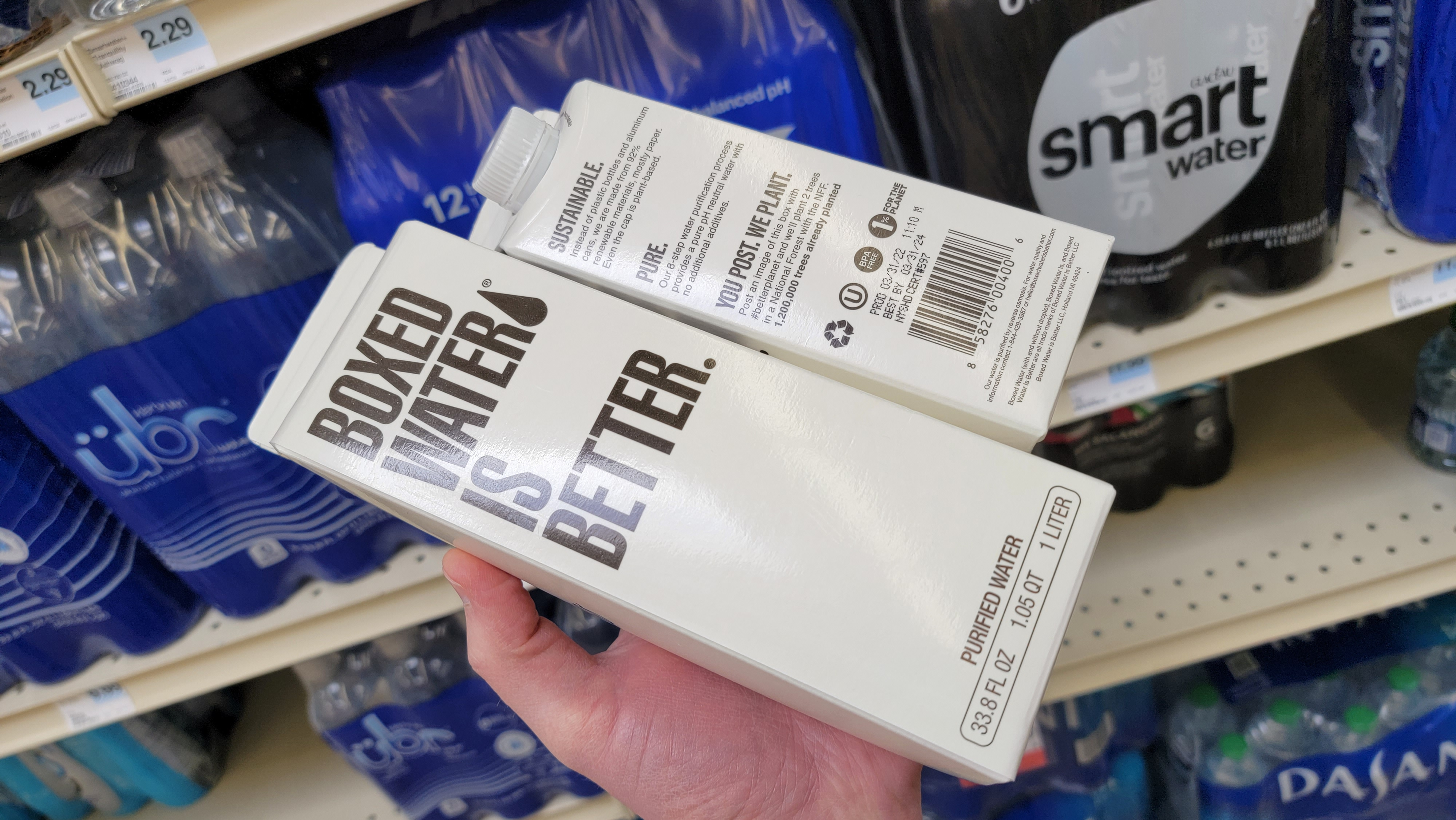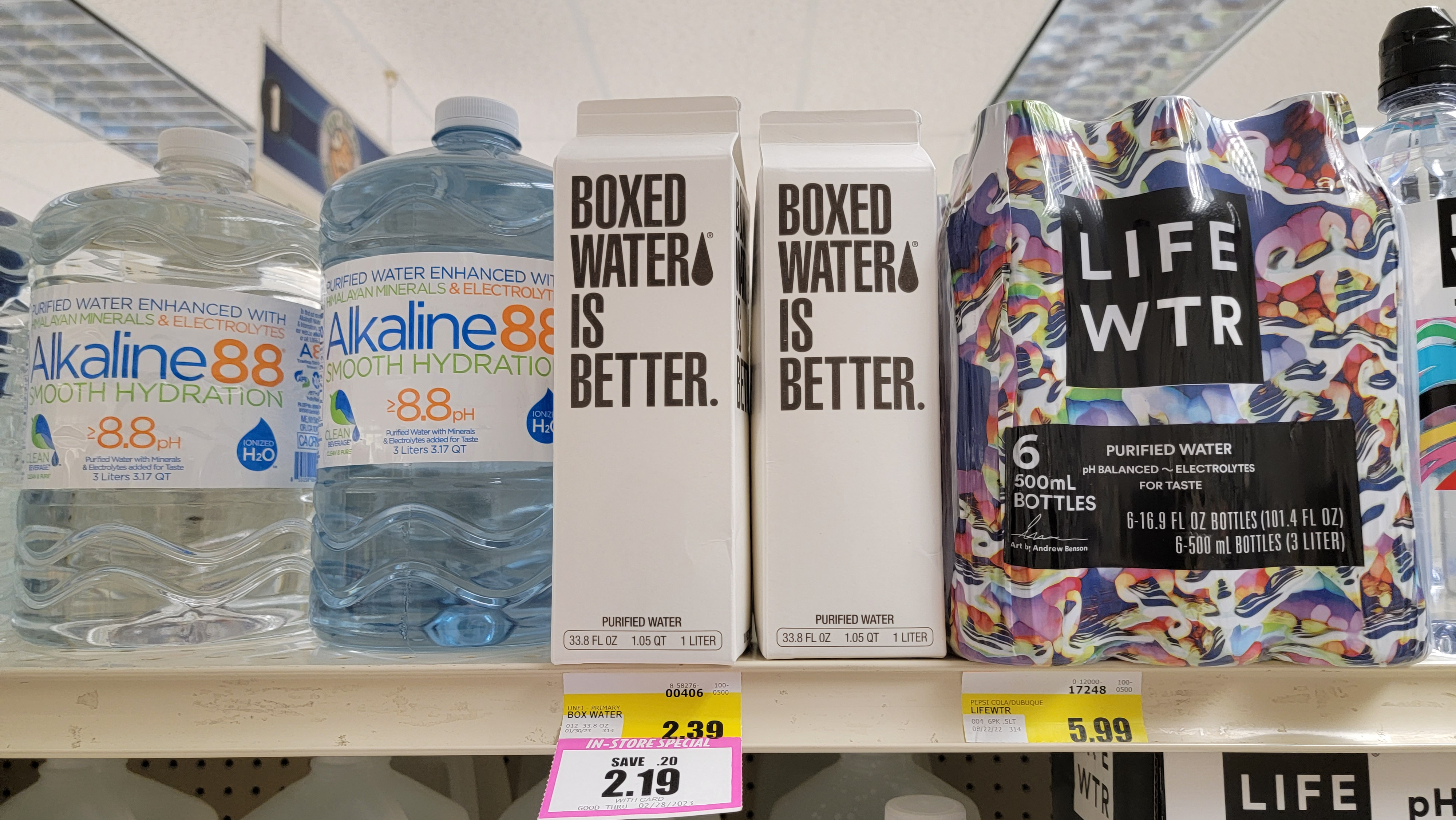The Slippery Environmentalism Of Boxed Water
This eco-friendly alternative may be more of a thirst trap.
Plastic bottles and I have a testy relationship. I spent years working in the industrial sector, sometimes in places where fresh water was either restricted or unavailable. Do you know how many cases of Pure Life a construction site can go through in a day? A lot—and the empties almost invariably wind up in the trash. (Unless they're left half-full, tucked away in steel beams or rafters. That's a different kind of health hazard altogether.) So when I saw those cartons of Boxed Water in the grocery store, I thought they were a neat alternative worth looking into.
Wow, did I open a can of worms. Or a bottle of worms, or maybe a carton, whichever is the most recyclable. As with most environmental issues, nothing about Boxed Water's product is as simple as it seems. Let's start with the company's eco-friendly marketing and see where things go from there.
Boxed Water sounds great on paper
Boxed Water indicates that its cartons are "now a certified CarbonNeutral® product by Climate Impact Partners... Compared to single-use plastic bottles and canned water, our plant-based cartons have a lower environmental impact throughout their lifecycle."
(This article previously quoted statistics from Accountable Science, also known as the Center for Accountability in Science, or the Center for Organizational Research and Education. This lobbying group has had its methods called into question on multiple occasions, and its data has been removed from this piece.)
Per Boxed Water, its cartons are "92% plant based... made from sustainably harvested pines and a cap made from tree pulp." This means 8% of the carton is made of non-plant-based material. Per Boxed Water's own statistics, 5% of this is aluminum, while the final 3% goes unlisted. This allows us to shift our focus to the "throughout their lifecycle" phrasing, specifically the end/beginning dynamic of the recycling phoenix.
While the components used in Boxed Water's cartons are indeed recyclable, they're a real pain to separate from one another, and doing so requires particular machines. As Fast Company explains, "While it is recyclable if it's sent to a facility with specialized equipment, many cities still don't accept the packaging, in part because they may not have enough volume to make it worthwhile to sort out the containers from the rest of the waste stream."
So, why not stick to drinking water out of aluminum cans? Well...
Aluminum cans aren’t always the best, either
By most measures, aluminum is one of the best materials we have when it comes to closed-loop recycling. This means that those cans of fizzy water can be used over and over again with the processing infrastructure currently in place. But, to paraphrase Earth911, just because you've gotten really good at making hamburgers doesn't mean that it takes no effort to grill for fifty people. Okay, I jazzed up the wording, but the concept is the same: "Recycling is a step in the right direction, but the process still requires a lot of energy and water. Just because a product is recyclable doesn't mean it is inherently sustainable."
Boxed Water is quick to point this out: "30% of aluminum cans are made with virgin aluminum, which is not a sustainable resource," the company states. "Mining for aluminum produces 120 million tons of bauxite waste annually. Choosing canned water over carton water doubles your carbon footprint."
Oof, have a side of guilt with those statistics. It's true that mining is a major environmental challenge. Do you know what else is rough on the planet? Long-haul transportation. And while they've got us on the ropes, the carton crowd lands a punch from an unexpected angle. Boxed Water states that, because its cartons ship flat, they take up less space. That means fewer trucks, less gas, and lower wear and tear on our highways.
But Fast Company throws in an objection when it comes to Boxed Water's lowered shipping impact: "That's good—but a plastic bottle made from 100% recycled plastic may actually reduce emissions even more."
If you've sucked down a Dasani or two over the past year, you'll surely have noticed the recent rebranding. Even Nestlé, that most hated of brands, has moved to selling Pure Life in bottles "made with 100% recycled plastic*." Notice the word "with," however, and the subtle asterisk. Just because dog food is made "with 100% chicken" doesn't mean that it's pure poultry. There's other stuff in there, too.
The most planet-friendly water comes from the tap
So, what's a thirsty Planeteer to do? Especially if you're stuck in an area where, thanks in part to deregulation, a train carrying toxic chemicals happened to burst into flames? Or say you live in Flint, or perhaps an area with a lot of fracking (This kind, not that one). In cases like these, bottled water, boxed water, cartoned water, or canned water becomes an absolute necessity.
And while my industrial experience doesn't reach the level of these catastrophes, I understand what it's like to work in an area where water simply isn't available. Trust me, using port-o-johns in sub-zero temperatures can teach you a lesson or two. But if you live in an area where your well or municipal water is safe, drinking from the tap is generally the most environmentally friendly option. Buy a reusable water bottle and pair it with a filtration system. Sure, those Brita filters aren't exactly biodegradable, but each one can replace a massive number of single-use containers.
But what do I know? I'm just an internet schmuck who knows how to use a search engine. Maybe Boxed Water and its team of experts knows something I don't. Let's bring in someone with a little more clout, like perhaps the Los Angeles Times:
"When considering global impact, it's often a struggle to not feel powerless. What can you, the individual, do to create change? Companies like Boxed Water are doing the leg work for you – being stewards of their resources, thinking about future impact, and battling the status quo. So, in this instance, affecting change is easy: Tote a reusable when you can, and when you can't, choose Boxed Water."
Well said. I wonder who wrote this. Wait... where's the byline? And what's that little notice above the title? "PAID POST: This is sponsored content. It does not involve the editorial or reporting staffs of the Los Angeles Times."
To recap, there is no perfect solution. If you're worried about stockpiling in case of a crisis, maybe check out a solution like Water Brick. But our best bets for making an everyday impact are these: Drink more from the tap wherever possible, bring a reusable bottle when you're on the go, and stay away from single-use packaging unless it's absolutely necessary.


